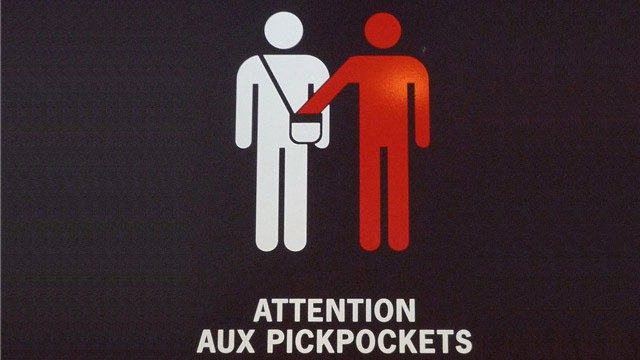
If you’re planning a trip to Europe you’ve undoubtedly been warned about the danger of pickpockets. It is important to be vigilant because thousands of tourists are victims of pickpockets each year—no one wants to spend their hard-earned vacation canceling their credit cards, replacing their passports, and finding alternative means to access money.
Luckily, there are many things you can do to deter yourself from becoming a pickpocketing victim. This guide will explain where pickpockets work, who they target, the different methods they use, and ways to protect yourself.
The Most Popular Cities for Pickpockets
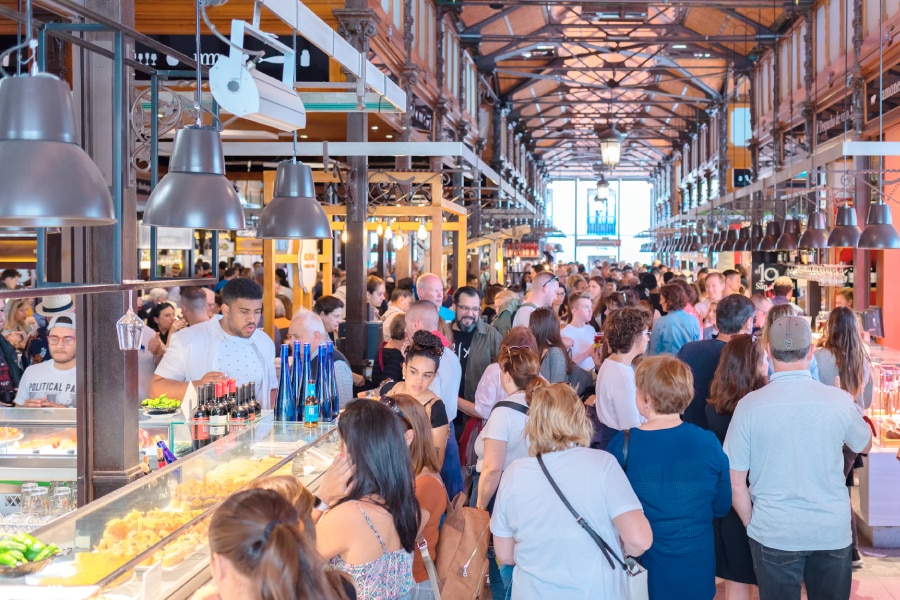
While pickpockets can be found in nearly any city, the biggest concentrations are in cities that attract the most tourists (no surprise there).
Here is a list of pickpocket hotspots in Europe:
- Barcelona, Spain
- Rome, Italy
- Paris, France
- Madrid, Spain
- Athens, Greece
- Prague, Czech Republic
- Lisbon, Portugal
- Florence, Italy
- London, England
- Amsterdam, Netherlands
But don’t think that pickpocketing only occurs in big cities. I have a friend who even had his wallet stolen in a small town in Switzerland.
Who Are Pickpockets?
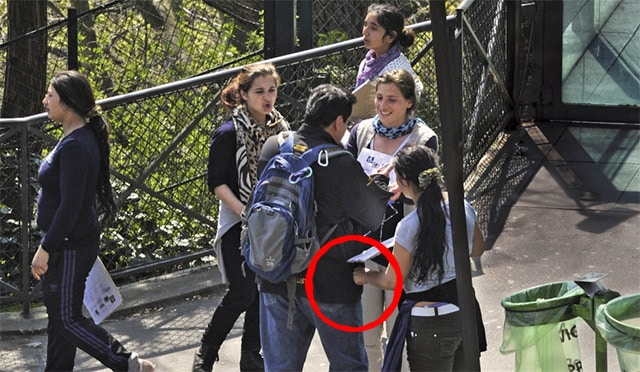
Most people assume pickpockets are sketchy-looking men, but many pickpockets are actually young girls and boys—usually around 10-16 years old. Most tourists don’t suspect a young child would steal from them so they let their guard down.
Additionally, police can’t really arrest minors, and most don’t travel with any identification, so even if they’re caught the police usually have to let them go.
Other times, pickpockets are well-dressed and you’d never expect them to be thieves.
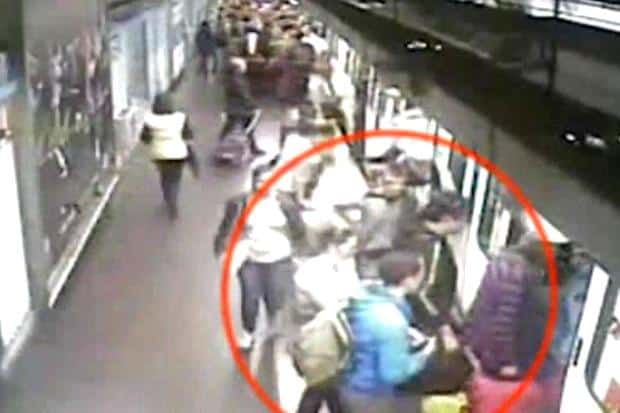
Pickpockets almost always work in groups. One or two people will do something to distract you while another member tries to take your stuff.
Once the theft has occurred, the thief who stole the item will often hand it off to someone else and they’ll all run in separate directions. This makes it very hard to track the culprit.
For a little fun, check out the TikToker who yells “Attenzione pickpocket!” when she spots pickpockets in Italy.
Where Do Pickpockets Target?
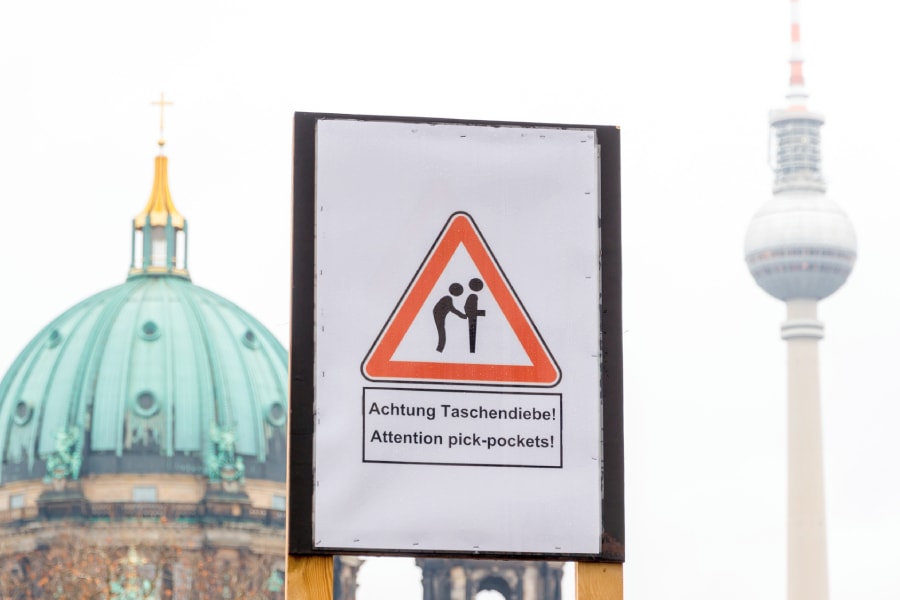
It’s no surprise that most thieves target places that are busy/chaotic and have a lot of tourists.
Here are a few spots where you should be extra vigilant:
Top Tourists Attractions

Whether it be the Eiffel Tower in Paris, Trevi Fountain in Rome, or Charles Bridge in Prague, it isn’t a surprise that pickpockets hang out in busy tourist spots. Naturally, tourists are more concerned about viewing the sights and taking photos than being attentive to their surroundings.
Public Transportation
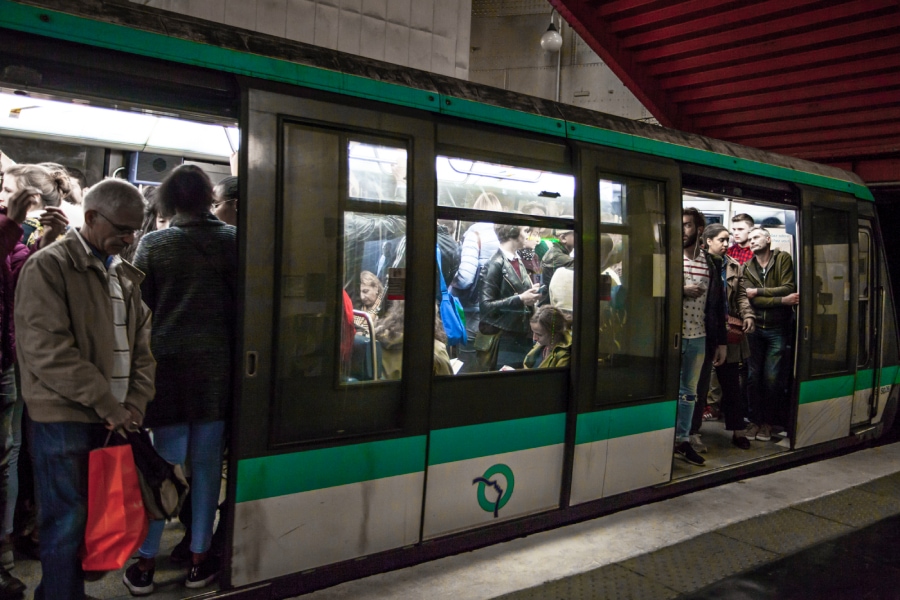
Subways and city buses are prime spots for pickpockets—and after living in Paris, I’ve seen my share of pickpockets on the Paris Metro. Public transportation is a great place for a pickpocket because it is often very crowded and it is easy for thieves to create confusion.
Pickpockets normally target large metro/subway stations where many transit lines converge because it gives them plenty of places to exit if they’re being chased.
Pay extra attention during rush hour and on routes that lead to the most popular tourist sights.
Museums
Europe’s most popular museums swell to maximum capacity (especially during the summer) and there are bound to be a few pickpockets among the lot. While the admission price deters most pickpockets, it doesn’t stop all of them from preying on unsuspecting visitors who are simply enjoying the art.
In fact, in 2013, workers at the Louvre in Paris went on strike because the pickpockets were getting so bad.
Train Stations
Train stations are large, crowded, and full of confused tourists with their hands full of cumbersome luggage—which is exactly the kind of environment pickpockets love.
Restaurants, Cafés, and Bars
Many people let their guard down when enjoying a meal or a drink so it’s easy for a crook to sneakily snatch a purse from the back of a chair or a mobile phone from the top of a table.
Never leave your phone on the table or your bag/purse unattended!
The Beach
Pay attention to your stuff when you’re at the beach. Don’t leave your bag unattended or out of sight because there is a good chance someone might snatch it up. The beaches in Barcelona are especially known for pickpockets.
Retail Stores
Clothing and department stores in Europe can get extremely crowded—especially around the holidays. These are easy places for pickpockets to target tourists who are usually carrying a lot of money.
The Sneaky Tricks Pickpockets Use To Steal Your Stuff
Distraction is the one tactic that all pickpockets use. They want to distract your attention just long enough to take your stuff. The following methods are well-known ways that pickpockets and thieves steal from tourists.
“Charity” Worker with Clipboards
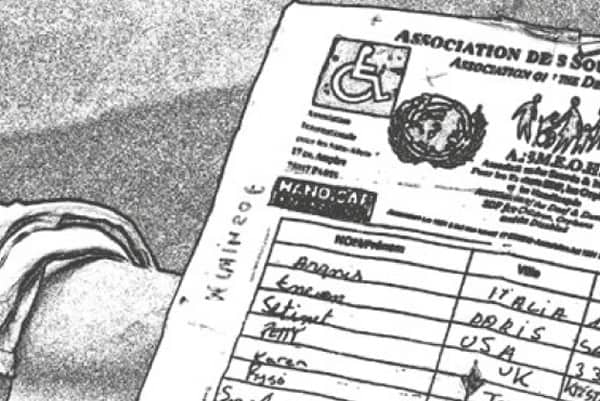
This scam is very popular in Paris. It nearly always involves a group of young girls with clipboards. They’ll approach you and point to a clipboard while signaling that they’re deaf and mute. They want you to sign a petition for charity. If you sign, they’ll ask for a donation to the charity. Of course, the “charity” is fake — in fact, the money often goes to these girls’ “boss” (i.e. human traffickers). While the tourist is signing/reading the petition, there is often an accomplice trying to pickpocket the victim.
Crowd the Metro
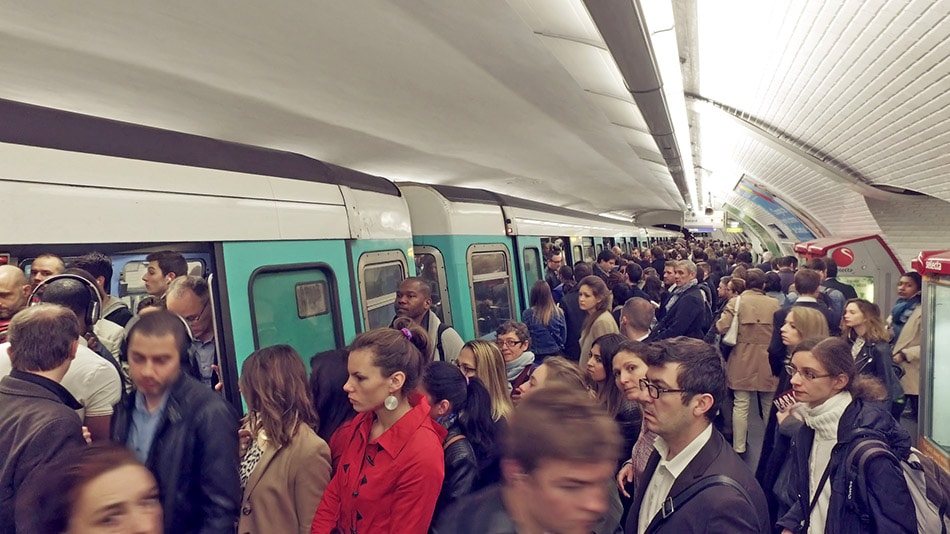
The metro (subway) trains can get very crowded. A common tactic is for a group of 4-6 kids to push on a crowded train shortly before the doors shut and crowd their target. They’ll swipe what they’re trying to steal and then they all hop off right as the doors begin to close. By the time the victim realizes what happened, it is too late and the train has already left the station.
Always be wary when a group of people crowds onto an already busy metro car. Also be wary of anyone who is standing very close to you on a train that isn’t crowded, as they might be up to no good.
Sidewalk Cafe Grab
Pay extra attention to your phone and purse/bag whenever you’re eating or drinking at a restaurant. Pay double attention when you’re at a sidewalk cafe as this is one of the most common places to get your stuff swiped.
Metro Smartphone Grab
People tend to zone out while they’re talking or texting on their phones. Be very careful about using your phone if you’re standing near the door of a subway car. Thieves will reach in and snatch your phone right as the doors close.
Help with Your Bag
Some metro stations have lots of stairs so “good samaritans” will grab ahold of your suitcase to help you carry it up the stairs. This usually takes people off guard a little and this is when their friend reaches into your purse or pocket. There are a lot of nice people who will offer to help carry a heavy suitcase, but they’ll ask you before grabbing onto your bag.
Bump and Lift
When you’re surrounded by crowds, it isn’t uncommon to accidentally bump into other people. However, this is a common move performed by pickpockets, so if someone bumps into you, it might be smart to take a quick inventory of your belongings.
Escalator Backup
Escalators are another area that pickpockets target because it is easy to create chaos. With this scam, there will be one or two people in front of the target and a few others behind the target. Someone near the top of the escalator will stop right when they get off and this will create a huge backup of people trying to get off. As the backup occurs, the people behind the target will reach into the target’s bag/pocket and hand off the goods to one of his buddies behind him. I’ve also seen it where they’ve handed off the goods to someone on the opposite escalator, so it’s almost impossible to chase them.
Newspaper/Map Distraction
A common pickpocket tactic involves using a large map or a newspaper to cover the target’s line of sight to take things out of their bag. They’ll often shove the map in your face, point to a part of the map, and then their friend will reach under the paper so you can’t see what they’re taking. This is a very common way that people steal mobile phones from tables.
ATM Confusion
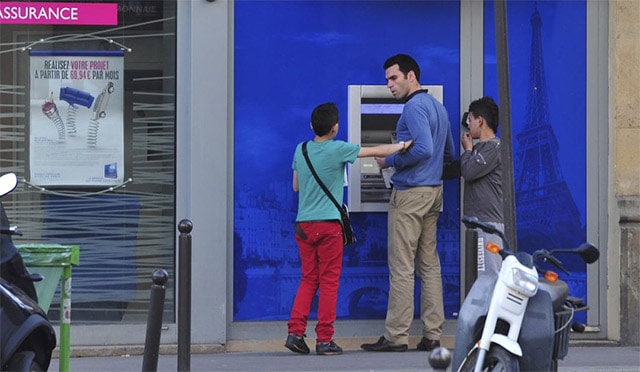
Always be careful when using the ATM — especially when you’re alone. While you’re in the process of withdrawing money, a group of beggars will approach you from behind to try and get your attention. They might pull on your arm or shove a piece of paper in front of the screen. If you turn toward one of the thieves, another one will slip in from the other side and press the button for the maximum amount of cash. Then they’ll swipe the money and run away.
Also, be sure to cover up your PIN code when you enter it. Some thieves will try to see your code (some even use hidden cameras) and then they’ll follow you around for a chance to steal your card.
Ticket Machines Dupe
Always be a little leery of people who try to help you at ticket machines. I know some people who got scammed in Paris by a well-dressed man who “helped” them buy Metro tickets. The visitors wanted to buy two 5-day passes, which cost about 30€/each, so the man offered to use his credit card because he told them Australian cards don’t work in the machines. He said that they could just pay him in cash.
He did buy the tickets… but he bought them a one-way child’s ticket (which looks very similar to a 5-day pass) that costs about 1€ and he pocketed 60€ in cash from them.
The Helpful Tourist
Don’t let pickpockets take advantage of your good nature. In this scam, one of the scammers will drop something in front of you and while you’re helping them pick up the mess, the other pickpocket will swoop in and lift something from your bag. That doesn’t mean you can’t help your fellow man, but just be careful about your own stuff while doing it.
Slashed Bag
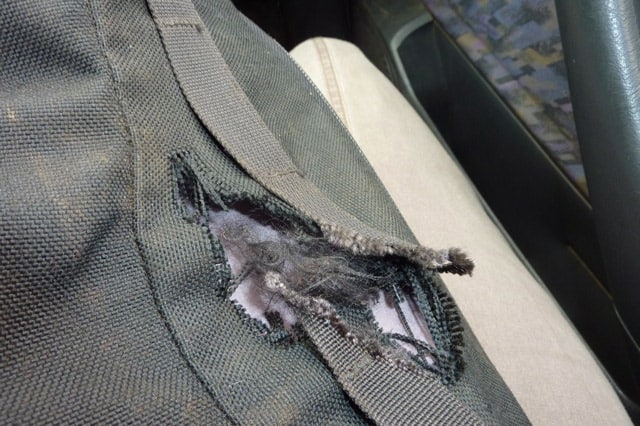
While rare, some pickpockets don’t even bother trying to steal your bag and they will simply slash it open with a knife. Pacsafe makes a range of slash-proof bags for extra security.
Turnstile Stall
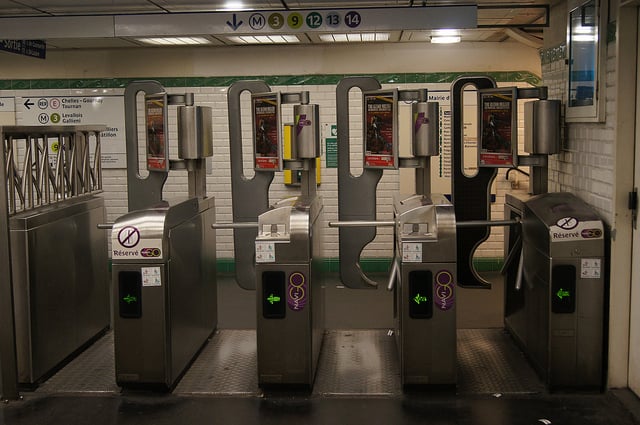
Busy turnstiles are a common area for pickpockets to strike. As you’re approaching a turnstile, one person will cut in front of you and then proceed to stop (they might pretend that the machine isn’t working) and their partner will come up behind you — essentially trapping you between the two of them. The person in the back will lift something from your bag or pocket while his partner in the front is fumbling with the turnstile.
Scooter Snatch and Run
While not super common, some thieves will drive up on a scooter, snatch a bag from the victim’s shoulder, and then ride off into the sunset. I wouldn’t be too worried about this technique, but it can happen.
Street Performances
Many street performances attract large crowds of tourists—which can often attract plenty of pickpockets as well (sometimes they’re all working together).
Fake Fight
A large group of men might start a “fight” around a tourist, and in all the commotion one of the men will attempt to pickpocket the target.
Who Do Pickpockets Target?
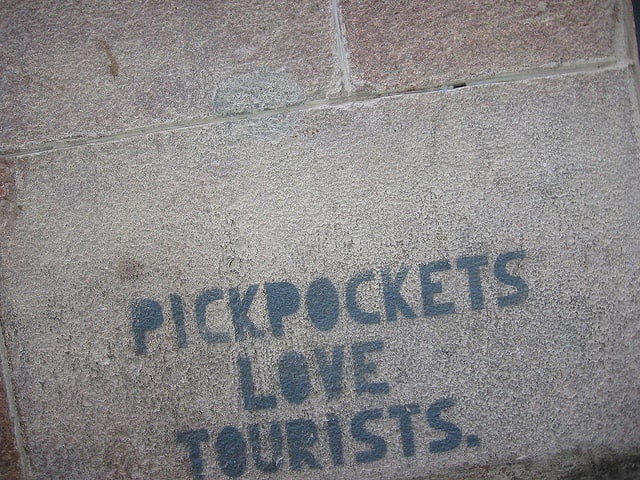
Anyone can be a potential target of a pickpocket, but they do tend to target certain types of people. Pickpockets will always look for the easiest target because they don’t want a confrontation.
Tourists
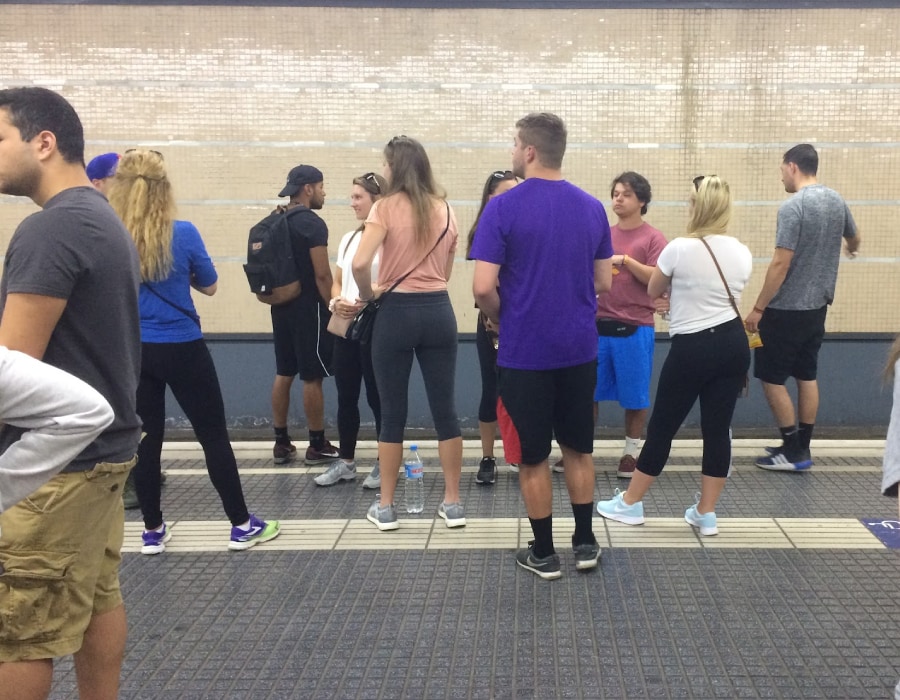
Duh, right? But tourists = money to pickpockets. If you look like a tourist, you’re automatically going to be singled out. Check out my article on how to not dress like a tourist in Europe.
People With a Lot of Luggage
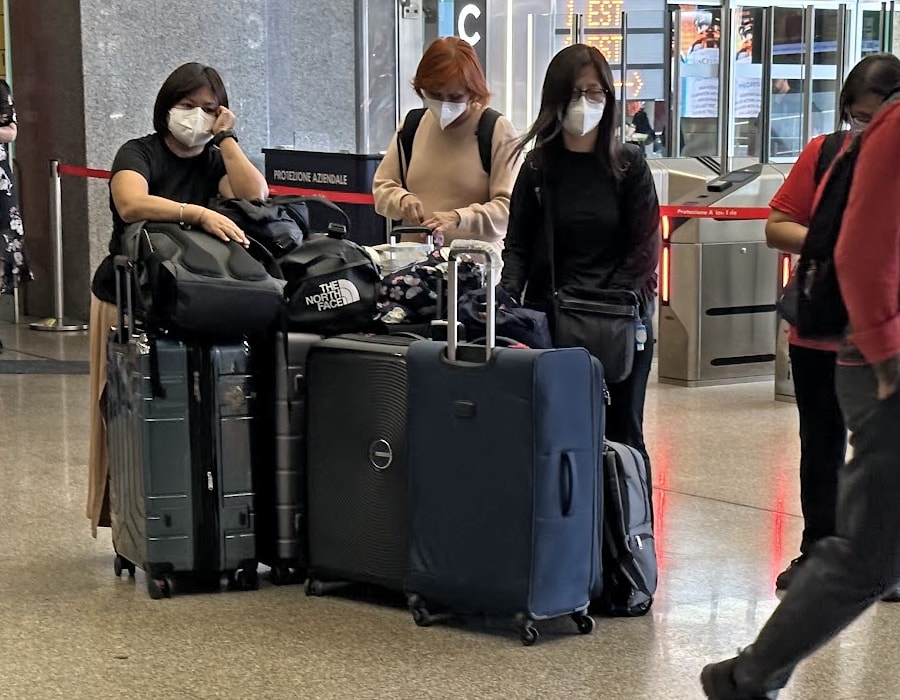
You’re going to be a prime target for a pickpocket if you are pulling along two giant suitcases and have a backpack. You won’t be able to watch over all your things since you have so much stuff and you’re a slow-moving target.
So pack light!
Check out my Backpacking Europe Packing List and Travel Europe Packing List for Women to get some tips on packing light and see my guide to the best travel backpacks to see my favorite travel bags.
Visitors from Asia
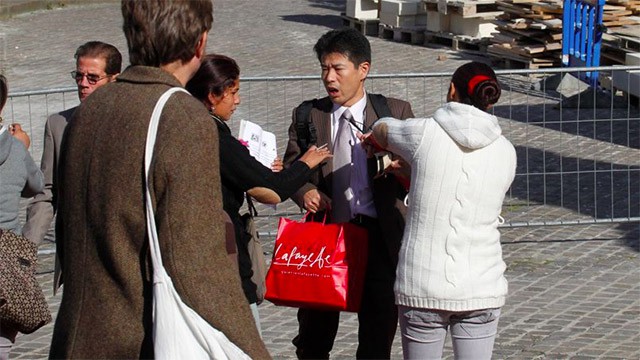
Asian visitors (specifically Chinese) are a top choice for pickpockets because many Chinese tourists are very wealthy. Additionally, a large number of Chinese citizens don’t have easy access to credit and debit cards so they carry large amounts of cash—and thieves know this.
So even if you’re not Chinese, but have Asian heritage, you might want to be especially cautious since you might be more likely to be targeted.
People Who Flash Valuables
Walking alone at night while using your iPhone? Don’t be surprised if someone takes it from you.
Trusting People
From all my travels, I’ve rarely met a more friendly bunch than the Australians. I’ve also never met another group of people who’ve been victims of pickpockets more often than Australians. I think the people who think everyone else around them is nice and helpful are the ones who get taken advantage of most often.
How To Protect Yourself From Pickpockets
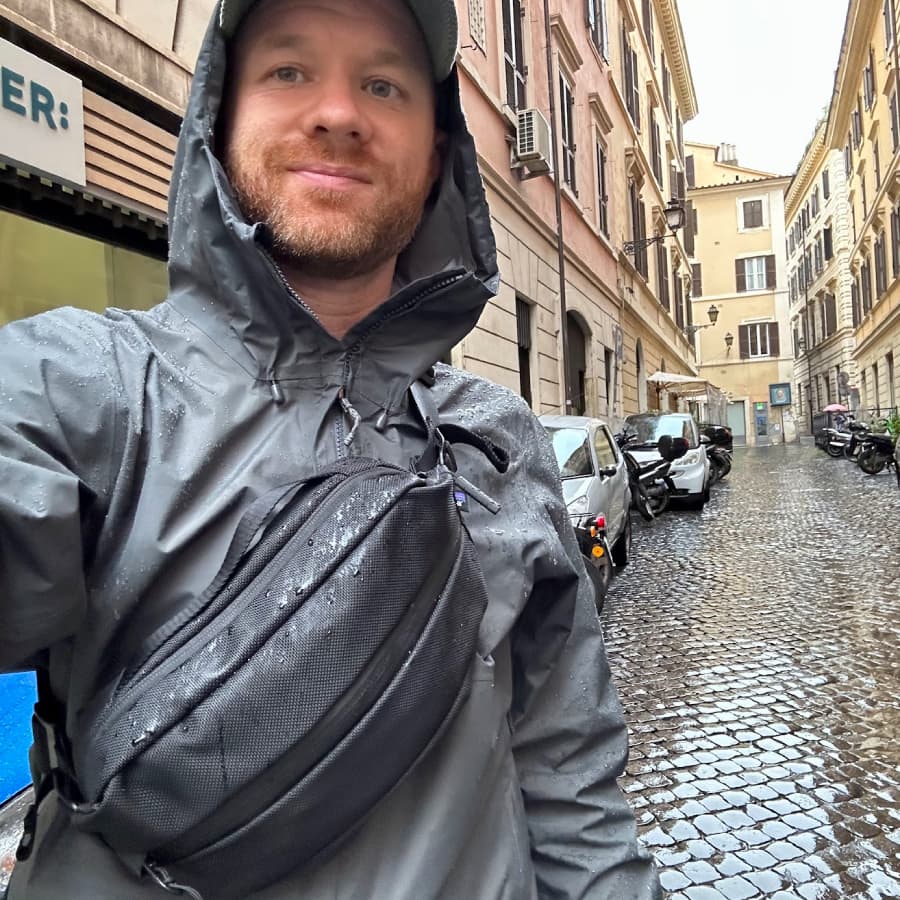
If you’ve made it this far, you might be thinking that there are thousands of pickpockets trying to rob every tourist in Europe. But that isn’t the case and you’ll rarely have any problems if you take a few extra precautions.
It is also important to remember that actual violent crime is low in Europe so there is a very low chance of anything happening to you.
In this section, we’ll talk about the steps you can take to avoid becoming a victim.
Pickpocket-Proof Travel Clothing
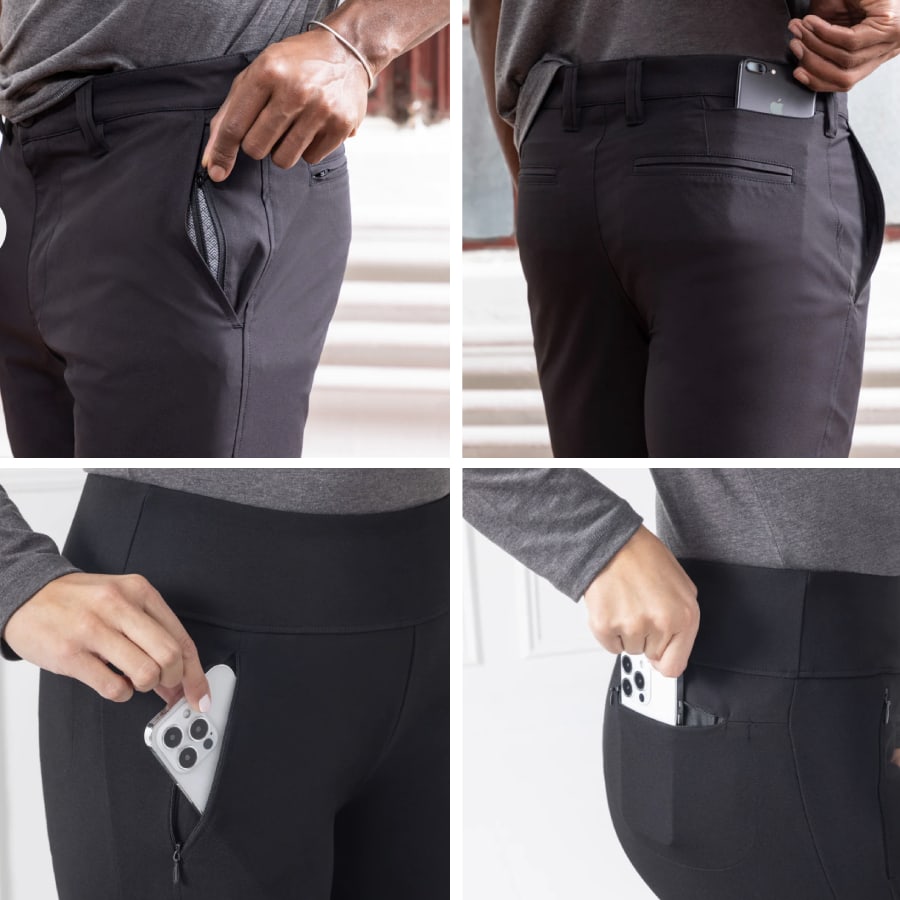
Companies are starting to make travel clothing security features that are great for deterring would-be thieves.
One of my favorite brands of anti-theft travel clothing is Bluffworks — they make travel pants, and, travel vests even travel suits that have hidden-zippered pockets. And, best of all, all their products look like normal clothing that you’d wear every day but are made out of high-tech fabrics.
Bluffworks also has fashionable women’s anti-theft travel clothing that is worth checking out.
Pickpocket-Proof Bags
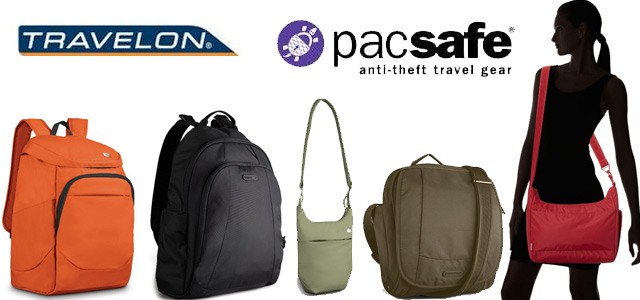
If you want to be extra safe, you can get yourself a specially designed “pickpocket-proof” backpack, bag, or purse.
The most popular anti-theft bags are made by Pacsafe. Their bags have tamper-proof zippers, cut-proof straps, anchored straps, and a slash-proof metal mesh sewn into the bag.
- Pacsafe has a large variety of styles and sizes of handbags, backpacks, and travel accessories.
- Travelon is another company that makes anti-theft bags.
Zippered Purse
One of the best ways to keep your valuables secure is to have a purse/bag with a zipper. I recommend keeping valuables in internal zipped compartments if possible.
Wear a Money Belt
A money belt is one of the most secure ways to carry valuables like extra money and your passport. However, many tourists make the mistake of thinking that they should use their money belt like a wallet — but it isn’t intended for that.
Ideally, you should keep the money and debit/credit cards that you’re going to need for the day in your wallet and then keep all extra cash and maybe a backup credit card in the money belt. The money belt should be worn under your clothes and should be fairly inconvenient to access (to deter thieves).
There are multiple styles of money belts available:
- Around the Waist — This is the traditional style of money belt. You wear it under your shirt and around your waist.
- Around the Neck — Money belts that hang around your neck are another good option. These are a lot easier to access (especially if you wear them under a button-up shirt).
- Hidden Pocket — These hidden pocket money belts are nice because they tuck into your pant leg and I think they’re more comfortable than one that goes around your waist.
- Belt with Pocket — If you just want to stash some cash, you can use a belt with a hidden pocket built-in.
Limit What You Carry
Pickpockets can’t steal what you don’t have—pretty simple. That is why I prefer to carry very little while I’m sightseeing. I especially recommend not carrying a lot of cash.
Secure Your Bag/Backpack
Your bag or backpack is probably the most vulnerable area that pickpockets love to target. Backpacks are especially vulnerable because you can’t see if someone is trying to get into it. Here are some tips for securing your bag.
- Wear Your Bag Backwards — On crowded public transportation, a lot of people wear their bags backward because this allows them to keep an eye on them.
- Lock Your Bag’s Zippers — At a minimum, you’ll want to lock your zippers. You don’t need anything fancy — a simple luggage lock will work well.
- Use A Sling Backpack — Sling backpacks are nice because they stay close to your body and they can be slung over your chest easily if needed. They do tend to be small, so you’ll have trouble if you plan on carrying a lot of stuff with you. Here is an example of a sling backpack, but there are many styles available.
- Secure Your Bag To An Immovable Object — When you’re at a restaurant, loop your bag’s strap around your leg or your chair leg so someone can’t come by and swipe the bag. Similarly, it is smart to secure your bag to a chair or luggage rack while you’re on a train — especially on overnight trains. A retractable cable lock will provide enough protection to deter most thieves but looping it around your chair is much easier.
Keep Your Wallet in Front Pocket
A lot of guys keep their wallets in their back pockets, but this is an extremely easy target for a pickpocket. And that is why it is advisable to keep your wallet in your front pocket. I highly recommend getting a super thin wallet because a bulky wallet feels very strange in your front pocket — and it looks kind of dumb. The Big Skinny Multi-Pocket Bifold Wallet gets a lot of great reviews for having a low profile.
Keep Your Phone Off The Table
Smartphones are a super popular item for pickpockets to target. Many people simply leave it on the table while they’re eating, which makes it easy for someone to come and snatch it up.
Split Up Your Valuables
Spread out your valuables so you’ll limit any damage if you do happen to get pickpocketed. For example, I’ll keep my credit card in my wallet but I’ll put a backup credit card in my luggage. And I’ll split up my cash between my wallet and bag so I don’t risk losing everything.
Final Thoughts About Pickpockets In Europe

The chances of you getting pickpocketed while traveling in Europe are low but it can happen. In fact, Italy reports 463 mentions of pickpocketing per one million visitors and France has 283 mentions per one million visitors so it’s statistically rare.
The real key is to not make yourself a target since pickpockets always want to find the easiest target possible. So be vigilant and take a few extra steps that I’ve outlined in this guide and you’ll have a great trip.
And while we’re on the subject of safety, check out my guide to common travel scams in Europe to learn other ways scammers try to take advantage of tourists.
- Guide To Using Smartphones, SIM Cards, and Data Plans In Europe - August 2, 2025
- Backpacking Europe Packing List — My Europe Travel Packing Guide - July 26, 2025
- The Best Travel Backpacks | In-Depth Buyer’s Guide & Backpack Reviews - July 5, 2025

No Funny Business
The Savvy Backpacker is reader-supported. That means when you buy products/services through links on the site, I may earn an affiliate commission—it doesn’t cost you anything extra and it helps support the site.
Thanks For Reading! — James
Questions? Learn more about our Strict Advertising Policy and How To Support Us.





